Commentary: Government-industry synergy is critical

As Filipinos enter the sixth week of the enhanced community quarantine (ECQ), the public health crisis has perceivably spilled over to the economic, political and social concerns of the population.
In this context, the Department of Agriculture (DA) has laid out a food resiliency action plan. As Secretary Dar expressed it, the department “is currently fine-tuning our food resiliency protocol, pursuant to the latest announcement by President Rodrigo Duterte, to ensure every Filipino household in the country, which are dependent on outside sources of food, will have access to safe and affordable food.”
The announcement in DA’s website reverberated throughout the different media outlets on that same date of March 17. But true enough, food resiliency is an imperative in this ECQ period and should be enforced. In this light, pronouncements can only be good as failed promises if both government and concerned industries would act separately,
As the mitigating response to the pandemic caused by the Wuhan virus is beyond the solitary means and capacity of government, food resiliency is also another undertaking that needs public-private synergy. While government regulates and restrains, the industry produces and distributes goods through free market operations.
Unhampered market operations do not only mean the free flow of goods and food products but more expansively involves the uninterrupted processes of production and distribution along the whole gamut of agricultural value chain.
The chicken and swine industries, for instance, comprise a big chunk of the whole livestock industry. Alongside them is a host of allied and associated, direct and indirect industries of small-, medium-, and large-scale production and distribution processes.
These sub-industries employ countless planters, growers and raisers, technologists, vets and manufacturers of veterinary drugs and supplies, dealers, assemblers, drivers, workers, people employed by the feed industry, corn, rice and coconut farmers and farmworkers, local packaging producers and etc. and provide livelihood to an entire ecosystem of agricultural economics.
In essence, chicken and swine production plays a big role in securing food resilience not only through the ECQ period but also beyond the public health crisis.
Towards this end, the degree of cooperation between government and the private sector during and beyond the crisis should be complementary and supplementary. In the spirit of regulation, while government should ascertain the needs of an industry in terms of supply and demand, the industry in turn informs and reminds government of the condition of its operations. This is very critical as the case of over-importation would create an excess of supply that would drive down the farm gate prices of chicken and pork meat and adversely affect the whole value chain, hence the livelihood of millions.
In 2018, the Philippines overwhelmingly exceeded the minimum access volume commitment to the World Trade Organization agreement by hundreds of million kilos both in chicken and pork meat.
Currently, Secretary Dar expressed that "For instance, we are projecting an ending stock in June 2020 good for 62 days for chicken and 10 days for pork, based on the data from the Philippine Statistics Authority and consultations with industry stakeholders themselves."
As for chicken, he said that its supply “is seen to surpass the annual requirement of 1.3 million metric tons (MMT) by 24%, equivalent to more than 400,000 MT (National Veterinary Quarantine Services Division), assuring us by January 2021 an inventory good for 157 days.” To this tune, importation of these meats should cease throughout the year.
If this is the case, it is quite disturbing to know from a government source that from April 6 to 9, 2020, the sanitary and phytosanitary import clearance for frozen chicken meat was 9.9 MMT (National Veterinary Quarantine Services Division).
This could only mean that importation is still being done during the ECQ period despite the assurance by the DA about the abundance of supply. Moreover, the situation becomes paradoxical given the department itself pronounces to “help small and medium broiler raisers who have been severely affected by the huge drop in farmgate prices of chicken.”
Of course, another factor that has hounded not only the chicken and meat industries is the wide-ranging illegal trade or smuggling, which has hurt all types of agricultural enterprises and other livelihood ecosystems as well.
As complicated as it is, the ECQ has been a bitter pill to swallow to deter the spread of the Wuhan virus. It has restricted the operations of various commercial transactions directly and indirectly associated with the chicken and swine industries.
It has likewise displaced a multitude of businesses and workers. Worse, once production cycles have been slowed down or stopped, the tendency to discontinue future operations automatically becomes an option to avoid losses.
However, the quarantine should not complicate further and/or derail the production and distribution of food. Through effective and well-crafted policies, the agricultural value chain would not be disrupted and operations toward food resiliency would be facilitated.
While food resiliency is very much attainable during and beyond the crisis period due to the presence of sufficient supply, a working government-industry synergy needs to be strengthened. It is in the cycle and synthesis of restrictions and freedoms where states and markets positively interact for the benefit of producers and consumers, particularly under a lockdown scenario.
Jaime Jimenez is deputy executive director for research of think tank Stratbase ADR Institute.
- Latest

























